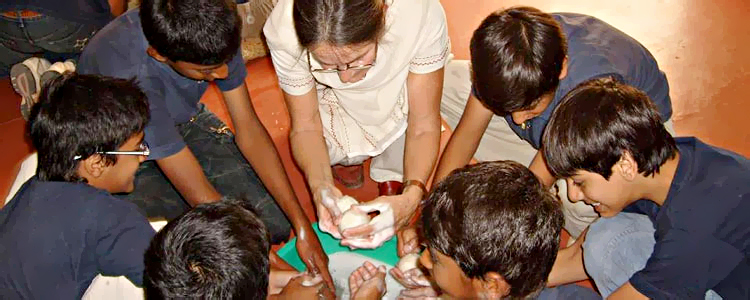A good teacher can make all the difference in a child's life. With patience and insight, a skilled teacher can call forth qualities and abilities in a child that were previously dormant and unrecognised. Sharing hour upon hour in the classroom, teachers spend as much time with children as parents do and particularly in a Waldorf school do they become an extended member of the family.
Contemporary parenting is a demanding assignment. Meeting the social, emotional and educational needs of a child is becoming more and more challenging. Extended work and travel schedules for mothers and fathers have contributed to reduced face-to-face family time and increased stress.
In addition, the growing physical distance between children and their grandparents, and other extended family members, means that children are isolated from parents who have to do their important parenting works over and above making ends meet. Waldorf teachers, with their first hand knowledge of the children and their understanding of child development and developmental needs, can provide support that parents need.
Teachers today have multi-faceted job descriptions requiring them to be communications majors, managers, researchers, parent educators, child psychologists, and more. It is not surprising that teaching is such a demanding assignment. Above all, this work asks for a wide array of truly human qualities. Waldorf teaching, like all good teaching, is surprisingly similar to thermodynamics. It involves the movement of light and warmth from within the teacher out into the classroom.
A Teachers role:
Waldorf education asks a lot of its teachers, but it gives a great deal in return. Teachers are urged to engage in the educational process in the same three-dimensional manner as the children, actively, emotionally, and thoughtfully. They are asked to be fully present in the classroom and in their preparation. Not surprisingly, good teachers invariably are avid learners. Searching for new insights and new approaches, Waldorf teachers continue to evolve throughout their teaching career. As class teachers move from grade to grade with their students teaching a new curriculum each year, they too receive an education, one that brings them a rich understanding of the natural world through subjects like astronomy, meteorology, botany, geology, and zoology.
In addition, Waldorf teachers survey the expanse of human history with children, exploring the ancient civilizations of India, Egypt, Persia, and Greece, as well as investigating the complex events of the 20th and 21st centuries. Just as the students are given a balanced education rich in science, math, the arts, and literature, teachers too develop a breadth of experience and expertise. But most importantly, Waldorf educators gain a deep understanding of human nature and of the developing human being.
In Waldorf Schools education is viewed as an art and the creative/artistic element is also part of a teacher's assignment. Painting, drawing, playing recorder, as well as writing poetry, stories, and songs for the children, are common activities for Waldorf teachers. The artistic element pervades the teaching and also the classroom. Teachers work throughout the school year to make their rooms beautiful by putting up displays to enhance their lessons and by coordinating the physical elements in the classroom the plants, curtains, and pictures, even the arrangement of the desks, in such a way as to make the space aesthetically pleasing.
This capacity for doing artistic work resides within every teacher just as it does within every child. It is the task of Waldorf teacher training to awaken this capacity. There are specific training programs for the different ages. Early childhood, grade school, and high school trainings are offered, as well as classes in the teaching of woodwork, handwork, music, and foreign language. These programs provide the foundation that teachers need to enter the classroom.
Once in the classroom all Waldorf teachers begin the important work of refining their skills through experience as they learn the most effective ways to engage children and to help them learn. Because all teaching has a strong element of on-the-job-training, Waldorf teachers embrace self-reflection and self-evaluation as important educational practices. Make no mistake there will be days, even in a Waldorf school, when a teacher's work will be less than satisfactory. But invariably, a Waldorf teacher's first thoughts will turn to what he or she can do better.
This is also the case when children present challenges. Although enabling children to succeed in school is of great importance, helping them when difficulties arise can be life changing. Challenging situations are important educational opportunities, not just for children, but for their teachers, as well. When these difficulties are resolved, when challenging situations are transformed, epiphanies occur and the child/teacher relationship deepens dramatically.
This difficult work cannot be done in isolation. A teacher needs the support of colleagues. A teacher's colleagues will also share in the practice of assessing children and improving teaching. The teaching community, which includes mentors and special subject teachers, as well as the administrative support staff, becomes a circle of support and reflection for teachers as they undertake the important work of improving their teaching for the good of the children.
Waldorf Education asks teachers for wholehearted involvement and for their best effort, but in return it offers an opportunity to make a tangible difference in the lives of their students. Waldorf teachers share in the important work of raising healthy children. Over the course of their teaching careers, they will touch dozens of lives deeply. In the process, their lives will also be changed, as will the lives of the children and parents who accompany them on this educational journey.
